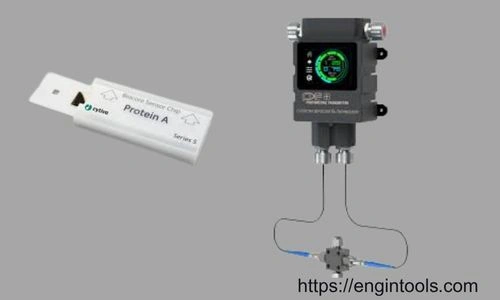What is a Protein Sensor?
A protein sensor is a biochemical tool designed to detect, quantify, or analyze proteins in various samples, including biological fluids (like blood, saliva, or urine), cell lysates, and other complex mixtures.
These sensors play a crucial role in fields such as biochemistry, molecular biology, and clinical diagnostics.

They utilize various detection methods, including fluorescence, electrochemistry, and surface plasmon resonance (SPR), to provide information about protein presence, concentration, and sometimes even structural properties.
How Does a Protein Sensor Work?
Protein sensors operate through several mechanisms, primarily involving the following steps:
1. Sample Preparation: The sample containing proteins is prepared and applied to the sensor.
2. Specific Binding: Most protein sensors utilize specific binding interactions, such as antibodies that bind to their target proteins. This specificity is essential for precise detection.
3. Signal Generation: Once the target protein binds to the sensor, a detectable signal is generated. This signal can take various forms, such as:
> Fluorescence: Fluorescent labels can be attached to antibodies or proteins, which emit light when excited.
> Electrochemical Signals: Changes in current or voltage can occur when the target protein binds to the sensor surface.
> Mass Change Detection: Techniques like surface plasmon resonance detect changes in mass on the sensor surface when proteins bind.
4. Data Analysis: The signal generated is quantified and analyzed to determine the concentration or presence of the target protein.
Types of Protein Sensors
Protein sensors can be categorized based on their detection mechanisms, specificity, and applications. Here are some common types:
1. Enzyme-linked Immunosorbent Assays (ELISA): Common in laboratories for quantifying proteins through antigen-antibody interactions.
2. Surface Plasmon Resonance (SPR) Sensors: These sensors measure changes in refractive index when proteins bind to the sensor surface.
3. Fluorescent Protein Sensors: Utilize fluorescent tags for protein detection and quantification.
4. Electrochemical Sensors: Measure electrical changes resulting from protein binding.
5. Nanomaterial-based Sensors: Use nanoparticles or nanostructures for enhanced sensitivity and specificity.
6. Mass Spectrometry-based Sensors: Analyze protein mass and structure through mass spectrometry.
Applications of Protein Sensors
Protein sensors have a wide range of applications across various fields:
Clinical Diagnostics: Used for detecting biomarkers for diseases, such as cancer or infections, in patient samples.
Drug Discovery: Involved in identifying and quantifying protein interactions and drug effects.
Food Safety: Used to detect allergens, pathogens, and contaminants in food products.
Environmental Monitoring: Employed in detecting proteins related to pollutants or toxins in environmental samples.
Research: Essential tools in basic and applied research for studying protein function, interactions, and expression.
Top 10 Highly-Rated Protein Sensors:
Protein sensors are specialized devices designed to detect and measure specific proteins, playing a crucial role in various fields such as medical diagnostics, environmental monitoring, and food safety.
While many advanced protein sensors are primarily available through specialized scientific equipment suppliers or research institutions, some commercially available options can be found on platforms like Amazon.
Here are some highly-rated protein sensors available on Amazon:
1: Thermo Scientific Pierce BCA Protein Assay Kit
A colorimetric assay kit for determining protein concentration in solution, suitable for a wide range of protein types.
2: Bio-Rad Protein Assay Dye Reagent Concentrate
A reagent concentrate for protein quantification, compatible with various protein samples.
3: Thermo Scientific NanoDrop 2000 Spectrophotometer
A microvolume UV-Vis spectrophotometer for rapid and accurate protein quantification.
4: Eppendorf BioSpectrometer Basic
A versatile spectrophotometer for protein and nucleic acid quantification, offering high accuracy.
5: Agilent Cary 60 UV-Vis Spectrophotometer
A compact spectrophotometer designed for protein analysis with high performance.
6: BioTek Synergy H1 Hybrid Multi-Mode Microplate Reader
A multi-mode microplate reader capable of protein detection using various assay methods.
7: PerkinElmer EnVision Multilabel Plate Reader
An advanced plate reader for protein assays, offering high sensitivity and flexibility.
8: Molecular Devices SpectraMax iD3 Multi-Mode Microplate Reader
A versatile microplate reader for protein quantification with touchscreen interface.
9: Thermo Scientific Multiskan FC Microplate Photometer
A microplate photometer for protein assays, offering fast and reliable results.
10: BMG LABTECH CLARIOstar Plus Microplate Reader
A microplate reader with advanced features for protein detection and analysis.
Please note that while these products are available on Amazon, some may be sold by third-party vendors, and availability can vary. Additionally, the selection of a protein sensor should be based on specific requirements, including the type of protein to be detected, sensitivity, and application context.
For more specialized or advanced protein sensors, it may be necessary to consult specialized scientific equipment suppliers or manufacturers directly.
Conclusion
Protein sensors are invaluable tools in research, diagnostics, and various applications, providing critical insights into protein behavior and function.
When selecting a protein sensor, consider factors such as specificity, sensitivity, and the intended application to ensure the best results for your needs.
Explore More Sensor Technologies
Looking to deepen your understanding of sensor innovations? Check out these expertly curated lists and detailed guides:
- Top 10 Voltage Sensors – Discover the most efficient and accurate voltage sensors used in modern electrical systems, ideal for engineers and hobbyists alike.
- Top 10 Touch Sensors – Learn about the leading touch-sensing technologies powering today’s smart devices, from capacitive to resistive options.
- Best RNA Sensors – Explore cutting-edge RNA sensor applications in biotechnology, diagnostics, and molecular research.
- Top 10 Antibody Sensors – Dive into antibody-based biosensors revolutionizing disease detection and biomedical research.
- Top 10 Distance Sensors – A comprehensive roundup of the best distance-measuring sensors, from ultrasonic to LiDAR, for robotics and automation projects.
